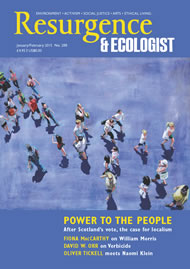In 1968 the American ecologist Garrett Hardin argued in the journal Science that it is human nature for self-seeking individuals to degrade non-private property. From this he concluded that private freedom and the commons were incompatible: though tragic, the commons would not survive. For decades this ‘Tragedy of the Commons’ thesis has been widely regarded as true.
In the 1970s, the economist Elinor Ostrom, working at Indiana University, began looking for evidence to test Hardin’s argument. Ostrom’s focus was common pool resources (CPRs), and, specifically, small natural commons over which nobody has private ownership. She acknowledged open-access CPRs that appeared to validate Hardin. But her research also unearthed a large diversity of cooperatively managed resources that disproved Hardin’s categorical argument. For this cross-disciplinary work she won the 2009 Nobel Prize in Economic Sciences.
In her book Governing the Commons (1990), Ostrom comprehensively profiled case after case of resilient commons practices on every continent, from fisheries management in the Philippines to rubber-tappers in the Amazon, to Swiss villagers managing their meadows, rivers and Alpine forests since the 13th century, and to water stewardship operating over hundreds of years in Spain.
Given this evidence, might the commons and a citizen-led provisioning economy become the norm in our lifetime in every sector from waste treatment to welfare services and from education to local enterprise, and fundamentally for redesigning money and banking? Former Ralph Nader researcher David Bollier had such an epiphany in 2003 and co-founded On the Commons to study, promote and track commons innovation.
A decade later Bollier’s pioneering work has marshalled powerfully the evidence of an emerging new economy of the commons. His book is compelling and demonstrates that this expanding movement is operating today in every trade and is diversifying from open-source software, kicked off by Linux in 1991 and now ubiquitous, to the seed-sharing commons in Andhra Pradesh, to the Peruvian Potato Park protecting hundreds of species of spuds, and to Couchsurfing, with millions of members providing free accommodation to travellers in cities and towns across the globe.
As Ostrom and Bollier demonstrate, the key difference between an ungoverned CPR and a resilient commons is the stewardship of a community co-managing the resource with ethical rules to weed out “shirkers, vandals and free riders”. Sounds intriguing, but what is the impediment? Two sectors appear ample company, and three a crowd.
Unfortunately we are ruled by a duopoly that Bollier traces to the enclosures that hived off the economy to the market, and governance to the nation-state. While over 2 billion people globally rely on commons systems economically for their livelihoods, these vernacular practices are under threat by land grabs by global investors.
Redeveloping legislation to validate commons as the third operating system with equitable weight to the market is crucial. The commons law for the sea, rivers, forests and grazing lands has its origins in Roman legislation passed by the emperor Justinian in 535 CE. Commons rights to subsistence (for firewood, turf and pasture) were granted in England under the Charter of the Forest in 1217 – two years after Magna Carta. Bollier describes a growing body of law to protect and expand open-source software and other commons through a range of creative commons licences and use rights.
Slow Food, community land trusts, co-housing, Wikipedia, Via Campesina, eco-villages, cooperative share issues and Transition Towns are all vibrant expressions of commons. However, the duopoly closes down alternatives endlessly. For a breakaway play, Bollier calls for a new social contract between the commons and the state. Politicians, NGOs, the green movement, the cooperative sector and trade unions need to think and act like commoners, he argues. He highlights emerging advocacy internationally by mayors hemmed in by austerity but listening to civic activists and glimpsing the potential for commonwealth solutions.
Bollier offers us a route map. Read it!







